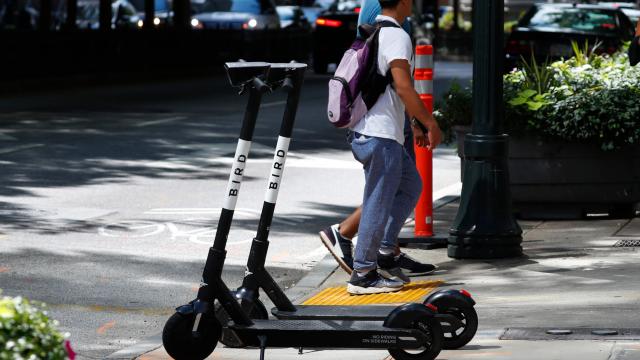Following the death of four scooter riders in the metro Atlanta area, the U.S. city has introduced a ban on the operation of permitted electric scooters and bikes during nighttime hours, the mayor’s office announced last week.
The nighttime ban went into effect on Friday and will apply to company-deployed e-scooters and e-bikes in the region between the hours of 9pm to 4am. According to a spokesperson for the mayor’s office, the nighttime rider restrictions will apply to permitted devices operated by Bird, Boaz, Bolt, Gotcha, Jump, Lime, Lyft, Spin, and Wheels in the Atlanta metro area. (Two companies, Spin and Boaz, have permits but had not deployed devices in the city at the time the nighttime ban went into effect.)
According to the mayor’s office, all of the companies have been asked to disable their devices during the designated hours.
“It is evident that immediate action is necessary to keep Atlanta’s residents and visitors safe,” Mayor Keisha Lance Bottoms said in a statement last week. “Sadly, we have seen a pattern in the recent and tragic fatalities involving scooters—they all occurred after sunset. Having a variety of mobility options is critical to any city, but safety must be our top priority. This nighttime ban, while we continue to develop further long-term measures, will ensure the safest street conditions for scooter riders, motorists, cyclists, those in wheelchairs and pedestrians.”
Those measures include plans for “safer, dedicated spaces” for e-scooter and e-bike riders, the city said, as well as a “revised selection process” to limit the number of dockless scooter vendors partnering with the city, a process that’s expected to be completed by February of 2020. The city began issuing permits for the deployment of the devices earlier this year.
Atlanta is hardly the first city to institute a crackdown on the devices following reports of misuse, injuries, and deaths — it’s not even the first city to propose a nighttime ban in response. A bill introduced by D.C. Councilmember Mary M. Cheh in June aimed to establish a nighttime ban on electric scooters and bikes between the hours of 10pm and 4am, among other proposed rules.
The city’s decision to implement the ban follows four e-scooter-related deaths in the Atlanta metro area, all of which — as Bottoms noted — included collisions with motor vehicles, including a commercial gas truck and a CobbLinc transit bus.
Still, the decision faced backlash from community members and mobility protesters who argue the ban “disproportionately affects third-shift and service industry workers,” and who say that more should be done to regulate the city’s cars. On Wednesday, protesters congregated outside of Atlanta City Hall to challenge the curfew.
“By the mayor’s own admission, Atlanta’s roads are dangerous. Yet, the nighttime scooter ban doesn’t address the true cause of the traffic violence and lives lost on the streets of Atlanta,” a Facebook page for the protest read. “In lieu of prioritising comprehensive speed reduction and protected infrastructure, the mayor picks on scooters and e-bikes as easy targets and has created an inequity issue that disproportionately affects third-shift and service industry workers.”
A spokesperson for the mayor’s office told Gizmodo by phone that it’s yet to be determined whether the ban will remain in place after additional safety measures have been taken, adding that there’s “a broader conversation to be had on instituting long-term measures to address safety and equity in mobility.”
Still, the ban does raise questions about whether such a move could see wider adoption in cities that are grappling with similar issues. For the time being, at least, the American scooter companies themselves appear to be playing ball. A Bird spokesperson told Gizmodo in a statement by email that it is complying with the curfew and exploring “long term solutions that more effectively meet the needs of all transit users—in particular, those who require access to transportation in the evening hours.”
Meanwhile, Nima Daivari, Georgia Community Relations Manager at Lime, commended the move and said in a statement sent to Gizmodo by email that “Bottoms has demonstrated exemplary leadership on how to best provide micromobility services to Atlanta’s residents and visitors alike.” (The company, interestingly, characterised the ban as “temporary.” While the city told Gizmodo that the night ban “is not necessarily permanent,” Tim Keane, Atlanta’s commissioner of city planning, has said the city hopes “that this ban is very temporary.”)
“This temporary pause on late night riding is a reasonable and measured approach as the City continues to work on its scooter policies,” Daivari added. “Lime will comply with the Mayor’s executive order and will continue to work closely with her administration to ensure a safe environment for all road users so Atlantans can continue to receive the benefits of a robust, low-cost, emission-free transportation system.”
